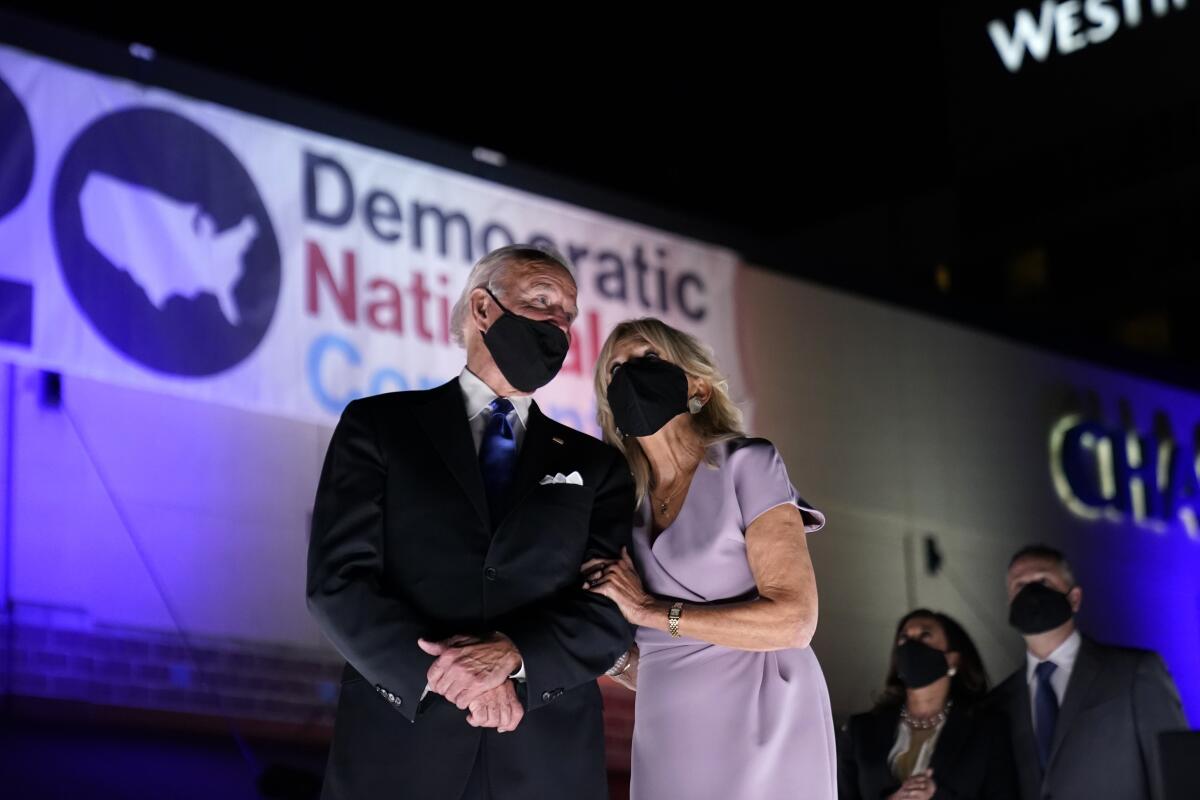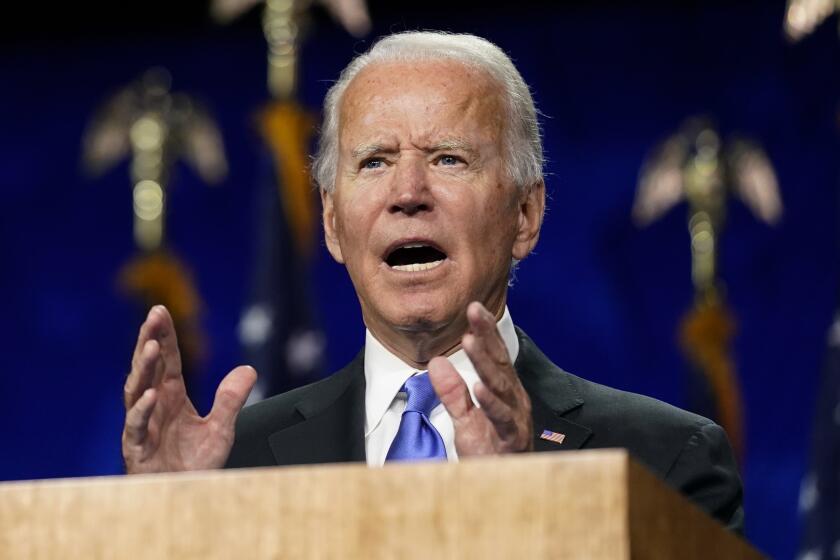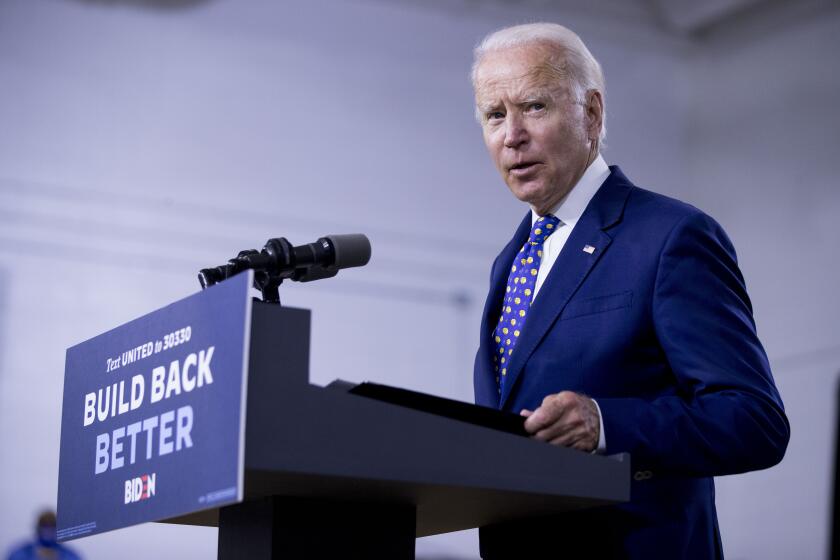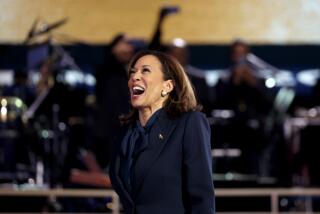5 takeaways from the final night of the DNC

The Democratic National Convention is over and — no surprise — Joe Biden accepted his party’s nomination for president on Thursday night.
In all the decades he coveted the presidency, Biden probably didn’t picture the moment quite as understated as it played out. But the all-virtual video format was fitting for these times amid a pandemic, and the convention’s tone of high-stakes urgency underscored Democrats’ desperation to beat President Trump.
Here’s what you need to know about the final night of the DNC.
A promise to end the ‘darkness’
These are not jubilant times and Biden did not deliver a jubilant acceptance speech. Instead, he portrayed himself as the nation’s protector and comforter, offering empathy for those feeling unmoored in these scary times and barely veiled disgust toward the incumbent president.
“Here and now I give you my word: If you entrust me with the presidency, I’ll draw on the best of us, not the worst,” he said. “I’ll be an ally of the light, not the darkness.”
Such was his theme throughout: a contrast of hope and despair, good and evil. His stern delivery — sometimes flashing anger when discussing his rival — matched what he called “this dark moment.” Biden never uttered Trump’s name.
Still, he ended on a note of hopefulness, offering a pep talk to a weary nation that this could be “the end of this chapter of American darkness.”
All in the family
Biden considered eldest son Beau Biden to be “Joe 2.0,” and predicted he would be president someday. Beau Biden’s death five years ago from brain cancer at 46 was a defining tragedy of Joe Biden’s already loss-scarred life.
Though Beau did not live to see his father accept the nomination, he appeared and spoke repeatedly -- in video clips played throughout the convention, particularly on Thursday night.
He was featured in a video about his father’s “moonshot” initiative to find a cure for cancer, and in another on his deployment to Iraq, intended to underscore Biden’s bond with military families. There was also a video solely dedicated to Beau’s memory, including a snippet from President Obama’s eulogy.
Later, Joe Biden’s surviving children — Hunter and Ashley — introduced a biographical film about their father, preceding his speech accepting the presidential nomination. Hunter’s appearance, though brief, was noteworthy, given how Republicans have tried to make him a lightning rod in this election. Trump’s quest to dig up dirt on Hunter‘s business dealings in Ukraine ultimately led to the president’s impeachment.
After Hunter and Ashley took turns delivering the lines of their testimonial to their dad, they gave the last word to Beau, shown speaking at the 2012 convention: “My father, my hero, Joe Biden.”
Joe Biden made his case for a major course correction in America, laying out his vision for a return to calm and stability as he accepted the Democratic presidential nomination.
Comic relief
The overall tone of this week has been achingly earnest, but on Thursday, Democrats tried to inject some comedy into the mix.
Host Julia Louis-Dreyfus — television’s “Veep” — peppered her commentary with jokes, straying from the solemnity of the previous night’s celebrity emcees. In one recurring shtick, she deliberately mispronounced Vice President Mike Pence’s last name, a jibe at his repeated mispronunciations of Kamala Harris’ first name.
Her comedy didn’t always work. The actress’ declaration that “Joe Biden goes to church so regularly that he doesn’t need tear gas and heavily armed troops to get there” — a swipe at Trump’s awkward pose at a church near the White House after the area was tear-gassed to clear protesters — struck a dissonant note after a moving segment on Biden’s faith.
Louis-Dreyfus wasn’t all snark, however. She sounded genuinely touched in recounting how Biden offered comfort when she was diagnosed with cancer. Also featured was comedian Sarah Cooper, whose short videos lip-syncing Trump’s more outrageous comments have made her a breakout star. Cooper mouthed along to one of Trump’s recent riffs against mail-in ballots. Then she spoke in her own voice, surprising many on social media who’d never heard it.
“I’ve heard Donald Trump say some pretty unhinged things,” she said. “But nothing is more dangerous to our democracy than his attacks on mail-in voting during a pandemic.”
Vote in the name of a hero
The four convention nights were full of exhortations to vote. To give those pleas particular punch, Democrats often invoked the spirit of the late Rep. John Lewis.
Thursday’s final program dedicated substantial time — particularly given the packed schedule — to honor the Georgia congressman and civil rights hero, who died last month after battling pancreatic cancer.
By emphasizing what Lewis endured during the civil rights movement of the 1960s to secure his right to vote — including brutal beatings and more than 40 arrests — Democrats sent a pointed message to viewers: Don’t let Lewis’ efforts be in vain.
“Congressman Lewis would not be silenced,” Atlanta Mayor Keisha Lance Bottoms said. “And neither can we. Our votes can be our voice.”
Joe Biden was formally nominated as the Democratic candidate for president in August. The Times tracks his path in pursuit of the presidential election.
Improvising, California-style
California Gov. Gavin Newsom had scored a prime speaking slot on the last night of the convention. Then hundreds of wildfires exploded across the state.
The governor scrapped his original plans, but appeared anyway — by cellphone video from the state’s redwood forests that have been devastated by fire. The setting proved a politically perfect one for Newsom to respond to news of the day: Trump, in Pennsylvania, had blamed California for failing to “clean the floors” of its forests and threatened to withhold disaster aid.
“You can’t make that up,” Newsom drily remarked.
His Plan B approach to his prime-time appearance felt appropriate for the Democrats’ week — with their entire convention upended by pandemic, they were left scrambling to adjust.
Democratic Party Chair Tom Perez acknowledged this was a nominating convention like no other, but he said he saw a silver lining in its unconventionality: The proceedings were “a more accurate reflection of where our country is than any traditional convention could’ve been.”
More to Read
Get the L.A. Times Politics newsletter
Deeply reported insights into legislation, politics and policy from Sacramento, Washington and beyond. In your inbox three times per week.
You may occasionally receive promotional content from the Los Angeles Times.













